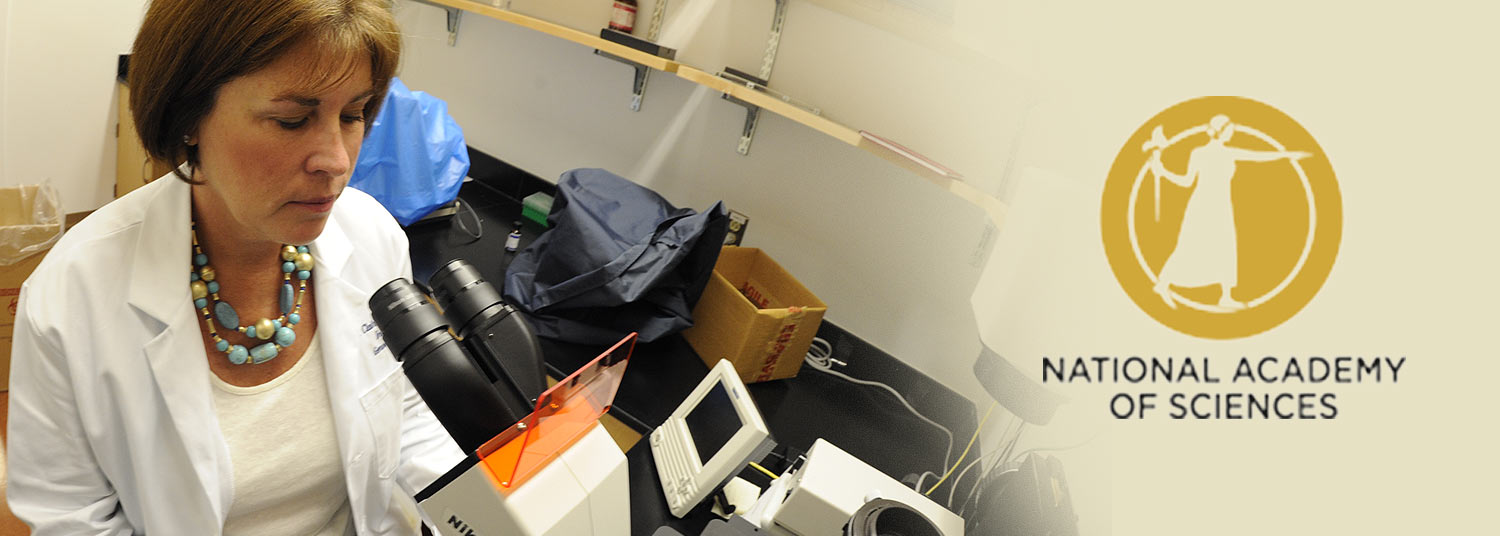August 23, 2023 | Heide Aungst

The National Academy of Sciences (NAS) has announced that Claire M. Fraser, PhD, the Dean E. Albert Reece Endowed Professor in the Department of Medicine at the University of Maryland School of Medicine (UMSOM), and the Founding Director of the Institute for Genome Sciences (IGS), has been elected as a new member of the prestigious academy. Dr. Fraser is one of 120 U.S. and 23 international new members elected on May 2, 2023 to the NAS, bringing its total U.S. membership to 2,565 members.
Dr. Fraser adds this prestigious appointment to a long list of scientific accomplishments during her career in the genomic and microbial sciences.
.jpg) “I am honored to be recognized in this way by the NAS,” Dr. Fraser says. “Throughout my scientific career, I have collaborated with some great scientists who are also NAS members— and have had the privilege to mentor early-career scientists who may someday also be elected to NAS. While I worked hard for my success, it is these kinds of collaborations that are the backbone of science, and I am thrilled to be included in this esteemed group.”
“I am honored to be recognized in this way by the NAS,” Dr. Fraser says. “Throughout my scientific career, I have collaborated with some great scientists who are also NAS members— and have had the privilege to mentor early-career scientists who may someday also be elected to NAS. While I worked hard for my success, it is these kinds of collaborations that are the backbone of science, and I am thrilled to be included in this esteemed group.”
In addition, Dr. Fraser has been selected by The New York Academy of Medicine (NYAM) to receive The Academy Medal for Distinguished Contributions in Biomedical Science. The Medal in Biomedical Science is given annually to accomplished investigators dedicated to using biomedical research findings to advance human health.
“By boldly leading the way in the unchartered territory of microbial genomics, you have fundamentally reshaped the way scientists and researchers understand human life. Your unparalleled achievements exemplify the spirit of this award,” Ann Kurth, PhD, CNM, MPH, President of NYAM, wrote to Dr. Fraser when notifying her of the award.
Charles Rotimi, PhD, Scientific Director of the National Human Genome Research Institute, will also receive the award this year. Dr. Rotimi was the keynote speaker at IGS’ 15th Anniversary Celebration last year.
Dr. Fraser also has been given the University of Maryland, Baltimore’s designation of Distinguished University Professor, which is the highest appointment bestowed on a faculty member at UMB.
In 1995 when Dr. Fraser was at The Institute for Genomic Research (TIGR) in Rockville, MD, she and her team were the first to map the complete genetic code of a free-living organism—Haemophilus influenza—the bacterium that causes lower respiratory tract infections and meningitis in infants and young children.
Her discovery forever changed microbiology and launched a new field of study—microbial genomics. During that time, she and her team also sequenced the bacteria causing syphilis and Lyme disease, and eventually the first plant genome and the first human-pathogenic parasite. She even helped identify the source of a deadly 2001 anthrax attack in one of the biggest investigations conducted by U.S. law enforcement. In 2007, Dr. Fraser launched IGS at the University of Maryland, which held over 25 percent of the funding awarded by the Human Microbiome Project.
Dr. Fraser came to UMSOM as one of the most highly cited investigators in microbiology. Through her career, she has authored more than 320 scientific publications, is the recipient of numerous awards, and was elected to the National Academy of Medicine in 2011. From 2019 to 2021, she held leadership positions at the American Association for the Advancement of Science (AAAS), serving for one year as President-elect, one year as President, and one year as Chair of the AAAS Board of Directors.
About the Institute for Genome Sciences
The Institute for Genome Sciences (IGS) at the University of Maryland School of Medicine has revolutionized genomic discoveries in medicine, agriculture, environmental science, and biodefense since its founding in 2007. IGS investigators research areas of genomics and the microbiome to better understand health and disease, including treatments, cures, and prevention. IGS investigators also lead the development of the new field of microbial forensics. IGS is a leading center for major biological initiatives currently underway including the NIH-funded Human Microbiome Project (HMP) and the NIAID-sponsored Genomic Sequencing Center for Infectious Diseases (GSCID). Follow us on Twitter @GenomeScience.
Contact
Heide Aungst
HAungst@som.umaryland.edu
216-970-5773 (cell)
